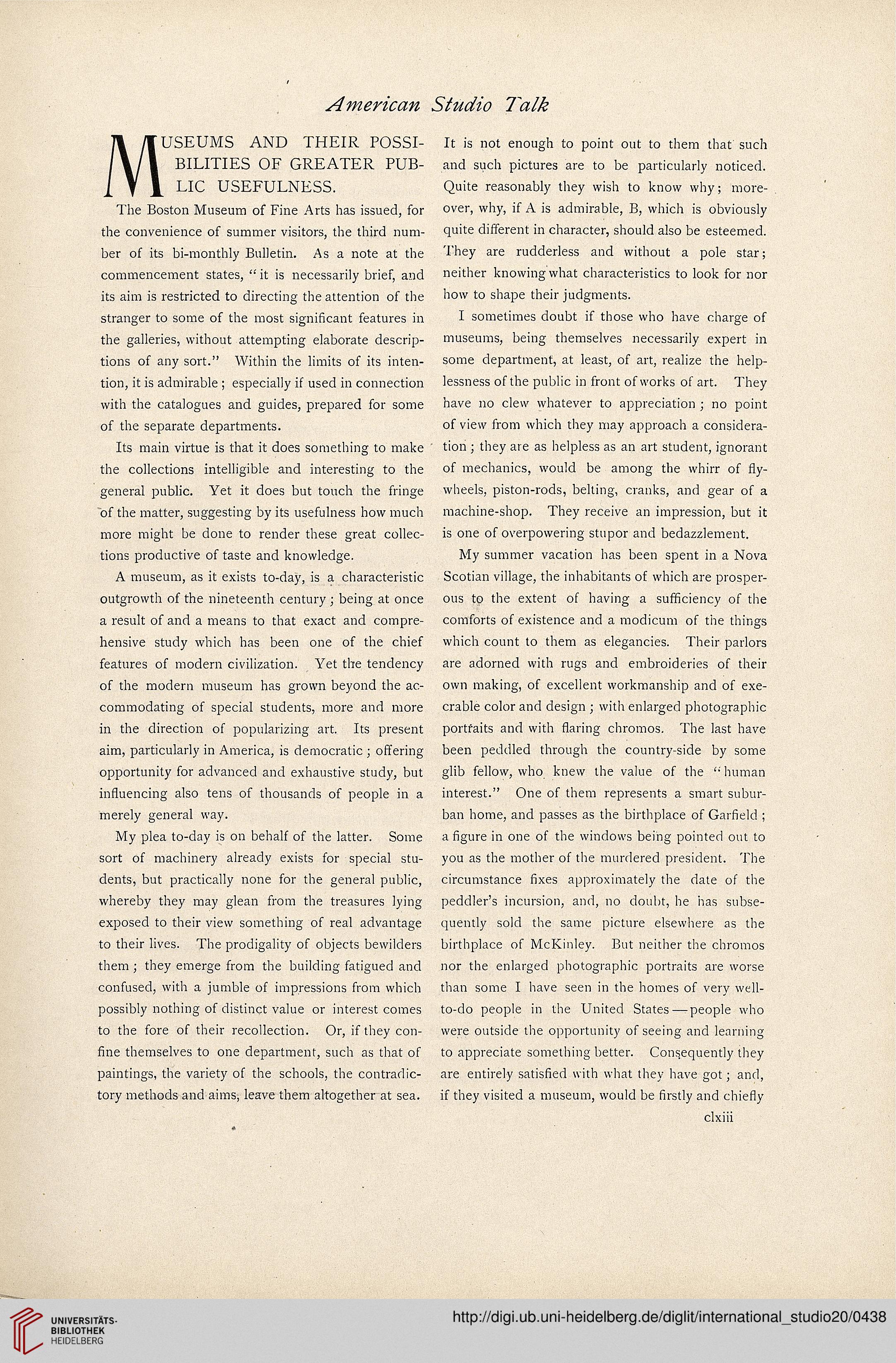7% /TUSEUMS AND THEIR POSSI-
i\/ S BILITIES OF GREATER PUB-
i Y 1 LIC USEFULNESS.
The Boston Museum of Fine Arts has issued, for
the convenience of summer visitors, the third num-
ber of its bi-monthly Bulletin. As a note at the
commencement states, " it is necessarily brief, and
its aim is restricted to directing the attention of the
stranger to some of the most significant features in
the galleries, without attempting elaborate descrip-
tions of any sort." Within the limits of its inten-
tion, it is admirable ; especially if used in connection
with the catalogues and guides, prepared for some
of the separate departments.
Its main virtue is that it does something to make
the collections intelligible and interesting to the
general public. Yet it does but touch the fringe
of the matter, suggesting by its usefulness how much
more might be done to render these great collec-
tions productive of taste and knowledge.
A museum, as it exists to-day, is a characteristic
outgrowth of the nineteenth century; being at once
a result of and a means to that exact and compre-
hensive study which has been one of the chief
features of modern civilization. Yet the tendency
of the modern museum has grown beyond the ac-
commodating of special students, more and more
in the direction of popularizing art. Its present
aim, particularly in America, is democratic ; offering
opportunity for advanced and exhaustive study, but
influencing also tens of thousands of people in a
merely general way.
My plea to-day is on behalf of the latter. Some
sort of machinery already exists for special stu-
dents, but practically none for the general public,
whereby they may glean from the treasures lying
exposed to their view something of real advantage
to their lives. The prodigality of objects bewilders
them ; they emerge from the building fatigued and
confused, with a jumble of impressions from which
possibly nothing of distinct value or interest comes
to the fore of their recollection. Or, if they con-
fine themselves to one department, such as that of
paintings, the variety of the schools, the contradic-
tory methods and aims, leave them altogether at sea.
It is not enough to point out to them that such
and such pictures are to be particularly noticed.
Quite reasonably they wish to know why; more-
over, why, if A is admirable, B, which is obviously
quite different in character, should also be esteemed.
They are rudderless and without a pole star;
neither knowing what characteristics to look for nor
how to shape their judgments.
I sometimes doubt if those who have charge of
museums, being themselves necessarily expert in
some department, at least, of art, realize the help-
lessness of the public in front of works of art. They
have no clew whatever to appreciation ; no point
of view from which they may approach a considera-
tion ; they are as helpless as an art student, ignorant
of mechanics, would be among the whirr of fly-
wheels, piston-rods, belting, cranks, and gear of a
machine-shop. They receive an impression, but it
is one of overpowering stupor and bedazzlement.
My summer vacation has been spent in a Nova
Scotian village, the inhabitants of which are prosper-
ous to the extent of having a sufficiency of the
comforts of existence and a modicum of the things
which count to them as elegancies. Their parlors
are adorned with rugs and embroideries of their
own making, of excellent workmanship and of exe-
crable color and design ; with enlarged photographic
portraits and with flaring chromos. The last have
been peddled through the country-side by some
glib fellow, who knew the value of the '* human
interest." One of them represents a smart subur-
ban home, and passes as the birthplace of Garfield ;
a figure in one of the windows being pointed out to
you as the mother of the murdered president. The
circumstance fixes approximately the date of the
peddler's incursion, and, no doubt, he has subse-
quently sold the same picture elsewhere as the
birthplace of McKinley. But neither the chromos
nor the enlarged photographic portraits are worse
than some I have seen in the homes of verv well-
to-do people in the United States—people who
were outside the opportunity of seeing and learning
to appreciate something better. Consequently they
are entirely satisfied with what they have got; and,
if they visited a museum, would be firstly and chiefly
clxiii




